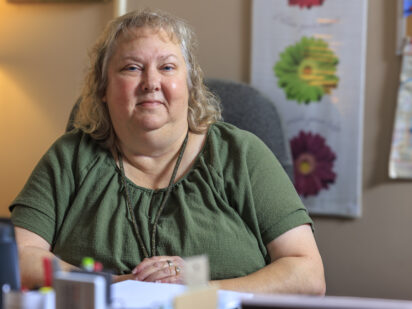Pam Schestler—a native of Garrison and longtime resident of the Des Lacs-Burlington area—has served 33 years at Trinity Health’s behavioral health inpatient unit. Schestler devotes her time as a social worker for adolescents and adults that are in acute crisis. Patients in acute crisis are at imminent risk of harming themselves, others and/or property; or may exhibit grossly disorganized behavior that impedes self-care. She and the inpatient behavioral health team see patients that are medically cleared through the emergency room’s staff. The emergency room doctor and psychiatrist help determine if patients are in an acute crisis. If the patient is in crisis, they can be admitted to Trinity Health’s inpatient behavioral health unit where Schestler and an expert team of caregivers help patients and loved ones throughout the inpatient stay.
With over three decades of knowledge, Schestler says that the one thing that sticks out the most from serving on the unit is change. “Over the years, how the trends have been evolving with healthcare has happened here too,” Schestler said. “You have to have a passion to keep going and I always had that passion.” Having a questioning attitude helps identify new opportunities and ways to be resourceful. “Always ask questions,” she said, “You can inquire about new things because everything is always changing. You never know when you might find a new resource available in the community.”
Schestler’s role is also being a leader for visiting students that are learning about social work. Throughout the years she has encouraged her students to leave work at work. “Being on the behavioral health unit has taught me to separate myself from work so you don’t become stressed and take it home with you,” she said.
Schestler also mentioned that one of the most challenging parts of the job is not being able to go home and talk about work. “That’s really when you realize that your team is your second family,” said Schestler. “A lot of things can happen in a hospital setting that employees can’t talk about with others outside of work. Working within a hospital setting with a team that is supportive makes a difference.”
When she’s at her job, Schestler works with a lot of families, friends and support networks that have loved ones in the behavioral health unit. First, she helps educate the support network about the diagnosis or observation of the individual and can educate them about the treatment plan. Then Schestler helps answers basic questions or gives daily updates about their loved ones throughout the inpatient stay. Finally, she continues to support by further linking the support network to agencies when they leave the hospital. Schestler said, “They [the loved one] can call and talk to the nurses, doctors and social workers. Social workers help develop care plans alongside the medical staff to facilitate safe discharge planning with the patient and support network.”
The safety planning ensures that the patient and support group receive resources that can help with a safe discharge. The patient will be given comunity support information and a contact to connect with the hospital to address questions or concerns. Community support information often includes patient resources to seek out mental health outpatient therapy services, support groups and addiction resources, when appropriate.

